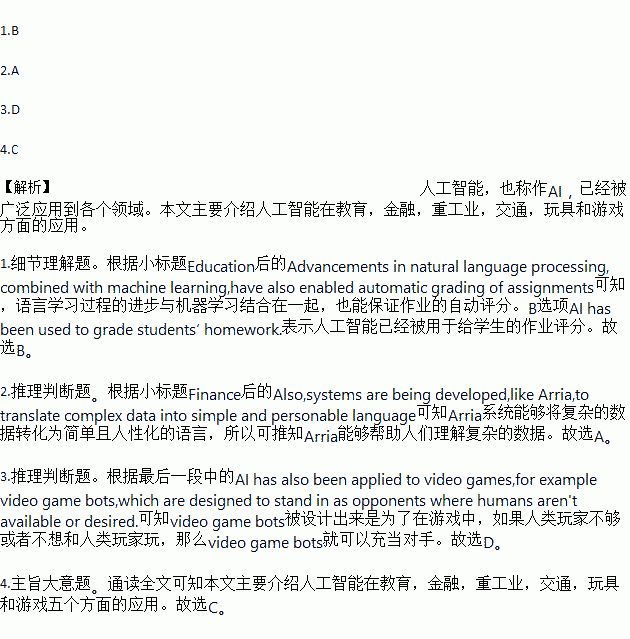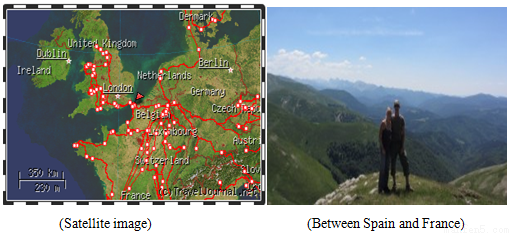题目内容
Artificial intelligence,or AI,has been applied in a wide range of fields to perform specific tasks,including education,finance,heavy industry,transportation,and so on.
Education
There are a number of companies that create robots to teach subjects to children ranging from biology to computer science,though such tools have not become widespread yet.Advancements in natural language processing, combined with machine learning,have also enabled automatic grading of assignments.AI has also led to an explosion in popularity of MOOCs,or Massive Open Online Courses,which allows students from around the world to take classes online.
Finance
Use of AI in banking can be tracked back to 1987.Banks use artificial intelligence systems to organize operations,maintain book-keeping,invest in stocks,and manage properties.Also,systems are being developed,like Arria,to translate complex data into simple and personable language.There are also wallets,like Wallet AI,which monitor an individual's spending habits and provides ways to improve them.
Heavy industry
Robots have become common in many industries and are often given jobs that are considered dangerous to humans.Robots have proven effective in jobs that are very repetitive which may lead to mistakes or accidents due to failure in concentration and other jobs which humans may find degrading.
Transportation
Today's cars can have AI-based driver assist features such as self-parking and advanced cruise controls.AI in transportation is expected to provide safe,efficient,and reliable transportation while minimizing the impact on the environment and communities.
Toys and games
Companies like Mattel have been creating AI-enabled toys for kids as young as age three.Using proprietary AI engines and speech recognition tools,they are able to understand conversations,give intelligent responses and learn quickly.AI has also been applied to video games,for example video game bots,which are designed to stand in as opponents where humans aren't available or desired.
1.Which is true about AI and education?
A. Robots have been widely used to teach children.
B. AI has been used to grade students’ homework.
C. AI has enabled more students to receive education at school.
D. Education was the first field where AI was used.
2.Which can be inferred from the passage?
A. Arria can help people understand complex data.
B. Wallet AI can help people make more money.
C. Robots’ jobs are considered dangerous to humans.
D. Robots can help people concentrate.
3.From the last two paragraphs we can know that_______.
A. Today’s drivers needn’t learn to park their cars
B. AI ensures safe,efficient,and reliable transportation
C. AI-enabled toys is designed to improve kids’ intelligence
D. Video game bots can fight against you in video games
4.What is the passage mainly about ?
A. The latest progress in AI. B. AI is of great use.
C. Some applications of AI. D. AI is used in all fields.
 天天向上一本好卷系列答案
天天向上一本好卷系列答案 小学生10分钟应用题系列答案
小学生10分钟应用题系列答案

 ople all over the world to communicate conveniently, but spam is destroying this convenience.
ople all over the world to communicate conveniently, but spam is destroying this convenience. u have gained, you'll never make sound(正确的)judgments if you don't have wisdom. Wisdom comes from imagination and reflection(反省).If you can imagine the possible future outcomes of your present decisions and actions, you can avoid mistakes.And if you can reflect on the mistakes you have made, you can avoid making the same mistakes again and again.Such is wisdom.
u have gained, you'll never make sound(正确的)judgments if you don't have wisdom. Wisdom comes from imagination and reflection(反省).If you can imagine the possible future outcomes of your present decisions and actions, you can avoid mistakes.And if you can reflect on the mistakes you have made, you can avoid making the same mistakes again and again.Such is wisdom.